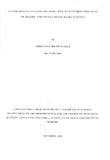| dc.description.abstract | Banking institutions rely on credible and reliable credit risk management system as a fundamental way of identification, measurement and control of credit risks in the sector. Managing credit risk remains an essential and challenging corporate function. Credit risk has been of real concern to banking industry performance because of its impact on interest income and contribution to the amount of non-performing loans.
The purpose of this study was to determine credit risk management practices adopted by Islamic and conventional banks in Kenya The specific arrears of research were geared to identify similarities and differences in Credit Risk Management practices adopted by Islamic banks and conventional banks. The researcher explored the gaps in credit risk management practice in general published literature on risk management.
The researcher used descriptive research method and random sampling technique to collect from the target bankers. 19 out of the 25 questionnaires sent out were responded to and 6 declined to respond. This represents an average response rate of 77% of total population which is considered significant enough to provide a basis for valid and reliable conclusions. The data was analyzed using SPSS and presented using tables, pie charts, graphs.
From the research findings, some conclusions were made about the study. It was found that Islamic banks do not have well established credit risk management practices as compared to conventional banks. This was observed by the disparities in monitoring of the credit risk levels, the duration taken by the institution to know that the customer has defaulted and how the institutions deals with difficult to pay on time clients. It was also concluded that both the conventional and Islamic banks take risks equally important with an exception of interest rates risk in Islamic banks as their loans do not accrue interest thus they do not have a risk with the interest rates.
Loan recovery mechanisms are different between conventional banks and Islamic banks with Islamic banks being more flexible thus preferring to restructure the Joan contrary to the conventional banks who prefer taking legal action on defaulters. Also Islamic banks have not yet started offering unsecured loans products as they see it as risky investments.
Generally the operations and management of credit risk practices were the same in both Islamic and conventional banks but with few differences in the nature products and methods used in appraising loans.
Thus taking into account the restrictions placed by the rules of Shari'ah pertaining to financial constraints. Besides some instruments used by conventional banks for credit risk management are not permitted to Islamic banks. This means that the ability of Islamic banks of dealing with credit risk as well as the means available to these banks for balancing claims and assets is limited. Further areas of study on credit risk management were recommended. | en_US |

